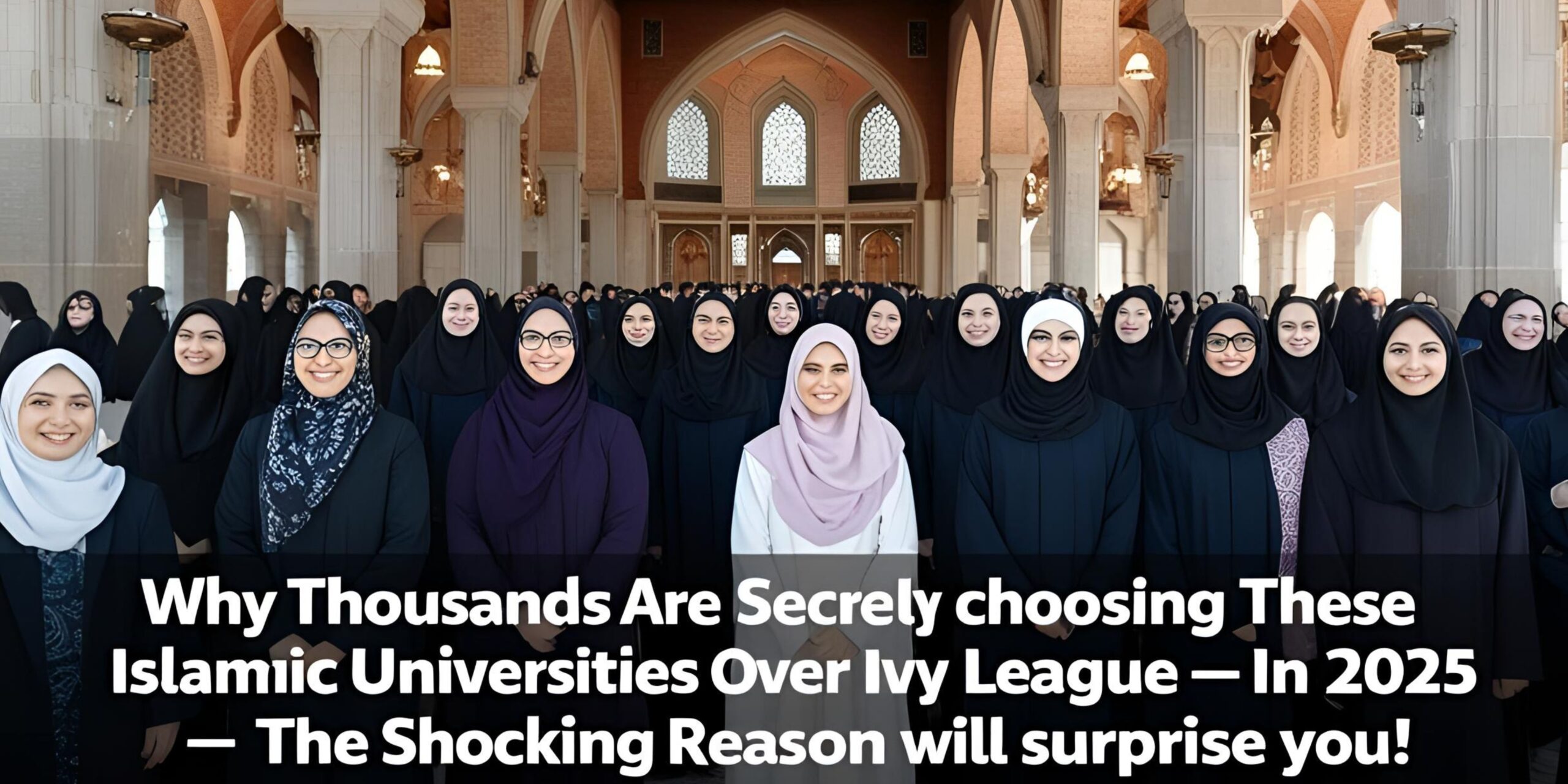In a surprising twist, many students worldwide are **choosing Islamic universities over Ivy League schools**. Once, names like Harvard, Yale, and Princeton filled every ambitious student’s dreams. But in 2025, things are changing, and the reasons go beyond just cost.
At first glance, this trend might seem puzzling. What could possibly lead top-performing international students to walk away from the prestige and pedigree of an Ivy League education in favor of Islamic universities, many of which are relatively young or lesser-known on the global academic stage?
The answer comes from a strong mix of **cultural identity, affordability, ethical education, innovation**, and a global change in **academic values**. This article explores this trend through real stories, insider insights, and how Islamic universities are quietly changing higher education.

The Rise of Islamic Universities on the Global Stage
Islamic universities have historically been seen as centers for religious scholarship.
In recent decades, especially the last five years, these universities have changed into modern institutions that mix academic excellence with moral purpose. Universities like International Islamic University Malaysia (IIUM), Al-Qarawiyyin University in Morocco, Al-Azhar University in Egypt, and Islamic University of Madinah now offer a range of globally relevant programs.
They cover fields from engineering, business, and medicine to media, AI, and environmental studies. These institutions are also blending modern disciplines with ethical frameworks based on Islamic principles.
Affordability Without Compromising Quality
One of the biggest pull factors is affordability. Ivy League tuition fees can climb upwards of $80,000 per year, excluding living expenses. In contrast, many Islamic universities offer world-class education at a fraction of the cost. For instance, international students at IIUM pay less than $5,000 annually — sometimes with housing included.
Plus, many of these universities are subsidized by governments or religious endowments (waqf), making education accessible to students from low- and middle-income families. Scholarships based on merit and need are more generous and inclusive than ever before.
Read more
A Deep Connection to Cultural and Spiritual Identity
For many students from Muslim-majority countries, Islamic universities provide a space that respects, nurtures, and celebrates identity. This is also true for students from non-Muslim backgrounds who seek meaning in their studies.
In contrast, some students feel alienated or isolated in Western institutions. This often happens due to rising Islamophobia and cultural misunderstandings.
At Islamic universities, there’s often a greater sense of community, support, and belonging.
“I felt like more than just a student number. I felt seen, valued, and spiritually fulfilled,” says Leila, a second-year student at IIUM from the UK.
Focus on Ethical and Values-Based Education
Islamic universities don’t just train students to make a living — they prepare them to live ethically responsible lives. Programs in business ethics, sustainable development, AI governance, and humanitarian leadership are on the rise.
While Ivy League institutions excel in innovation, critics argue they can sometimes emphasize profit over principle. In contrast, Islamic universities are redefining success beyond material gain, anchoring education in compassion, service, and justice.
Modern Campuses and Global Accreditation
A common misconception is that Islamic universities lag in infrastructure. But in 2025, many boast cutting-edge campuses with smart classrooms, AI-integrated labs, innovation hubs, and international partnerships.
For example, IIUM and Al-Azhar have established dual degree programs with European universities. This gives students the best of both worlds: a values-based education and a globally recognized qualification.
A Magnet for Diverse International Students
It’s not just students from Muslim-majority countries making the move. Increasingly, non-Muslim students are enrolling in Islamic universities for their academic offerings, ethical environment, and affordability.
Courses are often taught in English, making them accessible to global students. And the diversity on campus fosters rich intercultural dialogue and mutual respect.
“The environment here is deeply respectful and intellectually rigorous,” says Johan, a Swedish student pursuing a Master’s in Islamic Finance.
Tailored Programs for the Modern World
Islamic universities are tailoring their programs to meet 21st-century challenges. Whether it’s Islamic banking, halal entrepreneurship, Islamic psychology, or green technology, these institutions are combining tradition with innovation.
Graduates are finding roles in international NGOs, ethical finance sectors, interfaith organizations, and even launching their own startups with strong social impact missions.
Empowering Female Students Like Never Before
A lesser-known fact: Islamic universities are championing women’s education more actively than ever. In places like Malaysia, Turkey, and Jordan, women make up over 50% of student bodies in Islamic institutions.
Leadership programs, female-led research initiatives, and inclusive policies are helping bridge the gender gap and empower the next generation of female scholars, scientists, and entrepreneurs.
Flexible Admissions and Inclusive Curricula
Unlike the hyper-competitive, cutthroat admissions processes of Ivy League schools, many Islamic universities offer holistic admissions that look beyond just grades and test scores.
They value community service, moral character, and the ability to contribute meaningfully to society. And their curricula reflect this ethos, blending academia with moral and emotional intelligence.
Geopolitical Shifts and the Global South’s Rise
There’s also a bigger picture at play. As geopolitical power shifts toward the Global South, the idea of educational dominance is also decentralizing.
In a surprising twist, many students worldwide are **choosing Islamic universities over Ivy League schools**. Once, names like Harvard, Yale, and Princeton filled every ambitious student’s dreams. But in 2025, things are changing, and the reasons go beyond just cost.
At first glance, this trend might seem puzzling. What could possibly lead top-performing international students to walk away from the prestige and pedigree of an Ivy League education in favor of Islamic universities, many of which are relatively young or lesser-known on the global academic stage?
The answer comes from a strong mix of **cultural identity, affordability, ethical education, innovation**, and a global change in **academic values**. This article explores this trend through real stories, insider insights, and how Islamic universities are quietly changing higher education.
The Rise of Islamic Universities on the Global Stage
Islamic universities have historically been seen as centers for religious scholarship.
In recent decades, especially the last five years, these universities have changed into modern institutions that mix academic excellence with moral purpose. Universities like International Islamic University Malaysia (IIUM), Al-Qarawiyyin University in Morocco, Al-Azhar University in Egypt, and Islamic University of Madinah now offer a range of globally relevant programs.
They cover fields from engineering, business, and medicine to media, AI, and environmental studies. These institutions are also blending modern disciplines with ethical frameworks based on Islamic principles.
Affordability Without Compromising Quality
One of the biggest pull factors is affordability. Ivy League tuition fees can climb upwards of $80,000 per year, excluding living expenses. In contrast, many Islamic universities offer world-class education at a fraction of the cost. For instance, international students at IIUM pay less than $5,000 annually — sometimes with housing included.
Plus, many of these universities are subsidized by governments or religious endowments (waqf), making education accessible to students from low- and middle-income families. Scholarships based on merit and need are more generous and inclusive than ever before.
A Deep Connection to Cultural and Spiritual Identity
For many students from Muslim-majority countries, Islamic universities provide a space that respects, nurtures, and celebrates identity. This is also true for students from non-Muslim backgrounds who seek meaning in their studies.
In contrast, some students feel alienated or isolated in Western institutions. This often happens due to rising Islamophobia and cultural misunderstandings.
At Islamic universities, there’s often a greater sense of community, support, and belonging.
“I felt like more than just a student number. I felt seen, valued, and spiritually fulfilled,” says Leila, a second-year student at IIUM from the UK.
Focus on Ethical and Values-Based Education
Islamic universities don’t just train students to make a living — they prepare them to live ethically responsible lives. Programs in business ethics, sustainable development, AI governance, and humanitarian leadership are on the rise.
While Ivy League institutions excel in innovation, critics argue they can sometimes emphasize profit over principle. In contrast, Islamic universities are redefining success beyond material gain, anchoring education in compassion, service, and justice.
Modern Campuses and Global Accreditation
A common misconception is that Islamic universities lag in infrastructure. But in 2025, many boast cutting-edge campuses with smart classrooms, AI-integrated labs, innovation hubs, and international partnerships.
For example, IIUM and Al-Azhar have established dual degree programs with European universities. This gives students the best of both worlds: a values-based education and a globally recognized qualification.
A Magnet for Diverse International Students
It’s not just students from Muslim-majority countries making the move. Increasingly, non-Muslim students are enrolling in Islamic universities for their academic offerings, ethical environment, and affordability.
Courses are often taught in English, making them accessible to global students. And the diversity on campus fosters rich intercultural dialogue and mutual respect.
“The environment here is deeply respectful and intellectually rigorous,” says Johan, a Swedish student pursuing a Master’s in Islamic Finance.
Tailored Programs for the Modern World
Islamic universities are tailoring their programs to meet 21st-century challenges. Whether it’s Islamic banking, halal entrepreneurship, Islamic psychology, or green technology, these institutions are combining tradition with innovation.
Graduates are finding roles in international NGOs, ethical finance sectors, interfaith organizations, and even launching their own startups with strong social impact missions.
Empowering Female Students Like Never Before
A lesser-known fact: Islamic universities are championing women’s education more actively than ever. In places like Malaysia, Turkey, and Jordan, women make up over 50% of student bodies in Islamic institutions.
Leadership programs, female-led research initiatives, and inclusive policies are helping bridge the gender gap and empower the next generation of female scholars, scientists, and entrepreneurs.
Flexible Admissions and Inclusive Curricula
Unlike the hyper-competitive, cutthroat admissions processes of Ivy League schools, many Islamic universities offer holistic admissions that look beyond just grades and test scores.
They value community service, moral character, and the ability to contribute meaningfully to society. And their curricula reflect this ethos, blending academia with moral and emotional intelligence.
Geopolitical Shifts and the Global South’s Rise
There’s also a bigger picture at play. As geopolitical power shifts toward the Global South, the idea of educational dominance is also decentralizing.
Students are realizing they don’t need a Western degree to thrive. With tech innovation hubs emerging in Asia, the Middle East, and Africa, many are choosing to study where the future is being built, not just where the past was celebrateStudents are realizing they don’t need a Western degree to thrive. With tech innovation hubs emerging in Asia, the Middle East, and Africa, many are choosing to study where the future is being built, not just where the past was celebrated.
FAQs
u003cstrongu003eAre Islamic universities only for Muslims?u003c/strongu003eu003cbru003e
No. Many Islamic universities welcome students from all backgrounds and religions. Their curricula may be based on Islamic values, but academic content spans universal disciplines.
u003cstrongu003eCan degrees from Islamic universities be used internationally?u003c/strongu003eu003cbru003e
Yes. Many Islamic universities are internationally accredited and have partnerships with universities in Europe, the U.S., and Asia.
u003cstrongu003eAre courses taught in Arabic only?u003c/strongu003eu003cbru003e
No. A majority of Islamic universities offer programs in English, especially at the undergraduate and postgraduate levels.
u003cstrongu003eDo Islamic universities offer scholarships?u003c/strongu003eu003cbru003e
Absolutely. Many provide generous scholarships for academic excellence, financial need, or community involvement.
u003cstrongu003eWhich are the top Islamic universities in 2025?u003c/strongu003eu003cbru003e
Leading names include IIUM (Malaysia), Al-Azhar (Egypt), Al-Qarawiyyin (Morocco), Islamic University of Madinah (Saudi Arabia), and Istanbul University Faculty of Theology (Turkey).
A Growing Ecosystem of Alumni Success
Graduates from Islamic universities are making waves globally. From heading international NGOs to working at the UN, or starting successful ventures in ethical finance, these alumni are proving that you don’t need an Ivy League degree to make an impact.
Their stories are inspiring a new generation to think differently about success, purpose, and education.
Final Thoughts: A Quiet Revolution Is Underway
What we’re seeing in 2025 is not just a trend — it’s a paradigm shift. Students are asking deeper questions:
- What kind of person will this university help me become?
- Will I graduate with both knowledge and wisdom?
- Is success only defined by salary and status?
Islamic universities are answering those questions in a way that resonates with a new generation hungry for purpose, justice, and holistic success.
As the West grapples with its own educational challenges, Islamic universities are quietly rising — and students around the world are taking notice.
























Post Comment